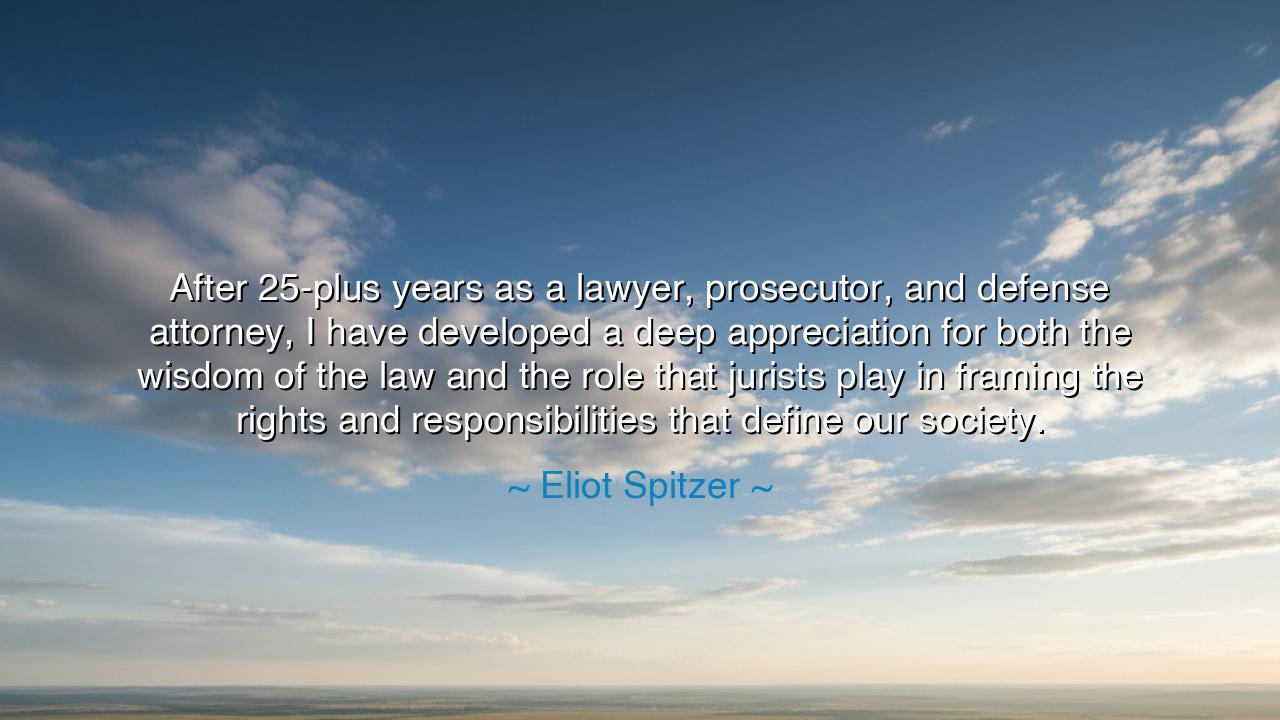
After 25-plus years as a lawyer, prosecutor, and defense
After 25-plus years as a lawyer, prosecutor, and defense attorney, I have developed a deep appreciation for both the wisdom of the law and the role that jurists play in framing the rights and responsibilities that define our society.






Eliot Spitzer, a man who has devoted his life to the practice of law, speaks with a deep reverence for the wisdom it holds: “After 25-plus years as a lawyer, prosecutor, and defense attorney, I have developed a deep appreciation for both the wisdom of the law and the role that jurists play in framing the rights and responsibilities that define our society.” In these words, he encapsulates the delicate balance that the law holds—shaped by the collective wisdom of jurists and the generations of men and women who have forged the rights and duties we live by. Law is not merely a system of rules; it is a living framework that binds together the chaos of human nature and guides it toward order and justice.
The meaning of Spitzer’s reflection is profound. The law is not just a mechanical set of rules to be applied without thought, but a body of knowledge, shaped by centuries of experience, trial, and reflection. Jurists, those who interpret and apply the law, hold a responsibility unlike any other: they shape the framework of a society’s rights and responsibilities. Through their decisions, they determine not only the course of individual lives but the very structure of the society in which those lives unfold. It is a task requiring not only knowledge of the law but a deep understanding of the moral and ethical principles that undergird it.
History gives us many examples of jurists whose wisdom shaped the course of nations. Consider Solomon, whose legendary judgment in the case of two women claiming to be the mother of the same child became a defining moment in biblical wisdom. Solomon’s ability to see through the deceit and make a decision that balanced justice with mercy became the foundation for his reign, and his wisdom is still revered today. In this, we see the dual role of the jurist: not only a servant of the law but a steward of justice, charged with applying the wisdom of ages to the unique circumstances of the present.
Spitzer’s words also call us to recognize the transformative power of the law in shaping human society. The rights and responsibilities we hold today were once fought for in courts of law, shaped by the minds of jurists who had the courage to challenge outdated structures and make bold decisions. In the U.S. Supreme Court, for instance, the decisions in landmark cases such as Brown v. Board of Education overturned centuries of segregation and redefined the rights of African Americans. This was not a mere application of the law, but a profound act of wisdom, a re-envisioning of what society could be.
Therefore, let the seeker of wisdom understand this: the law is not an inert object, but a living force that reflects the wisdom of those who interpret it. Jurists hold the delicate task of balancing the rights of the individual with the needs of society, knowing that their decisions will ripple across generations. Spitzer’s reflection on his years of service reminds us that true wisdom in the law does not just rest in legal texts but in the ability to apply it with fairness, integrity, and a deep understanding of its impact on the human soul.






TTle thanh tam
Reading this, I wonder how much of his perspective is shaped by the formalities of law versus practical outcomes. How do jurists truly frame the rights and responsibilities he mentions, and are there instances where legal wisdom might conflict with societal justice? Does his experience make him more of a realist about the law’s limitations, or an idealist about its potential? I’d like to understand which challenges in law he finds most compelling or troubling.
PAQuach Phuong Anh
I can’t help but ask whether his deep appreciation for the law extends to controversial or unpopular rulings. Does working as both a prosecutor and defense attorney create empathy for defendants, or does it reinforce a strict adherence to legal procedure? Furthermore, how might this dual perspective influence his view on legislative change or judicial activism? I’d be interested in hearing his thoughts on the tension between societal norms and legal mandates.
MTLe Minh Tuan
This statement makes me reflect on the human side of jurisprudence. How does firsthand exposure to both prosecution and defense inform a person’s understanding of justice? Could it be that such experience provides unique insight into the nuances of fairness and ethical responsibility? I’d like to know whether his work with jurists has altered his perception of what constitutes moral versus legal obligation in complex cases.
APMinh Anh Pham
I’m curious about how years of experience on both sides of the courtroom might shape one’s views on legal reform. Do you think someone with such a background would prioritize protecting individual rights over maintaining procedural efficiency, or is there a balance that only comes with experience? I wonder if his appreciation for the law’s wisdom also translates into a critical eye for its shortcomings, particularly in areas where legislation hasn’t kept pace with societal changes.